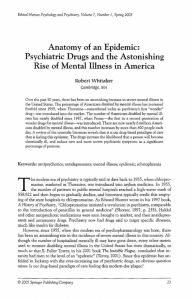Reports of Research Proving Recovery Is Possible
advertisement
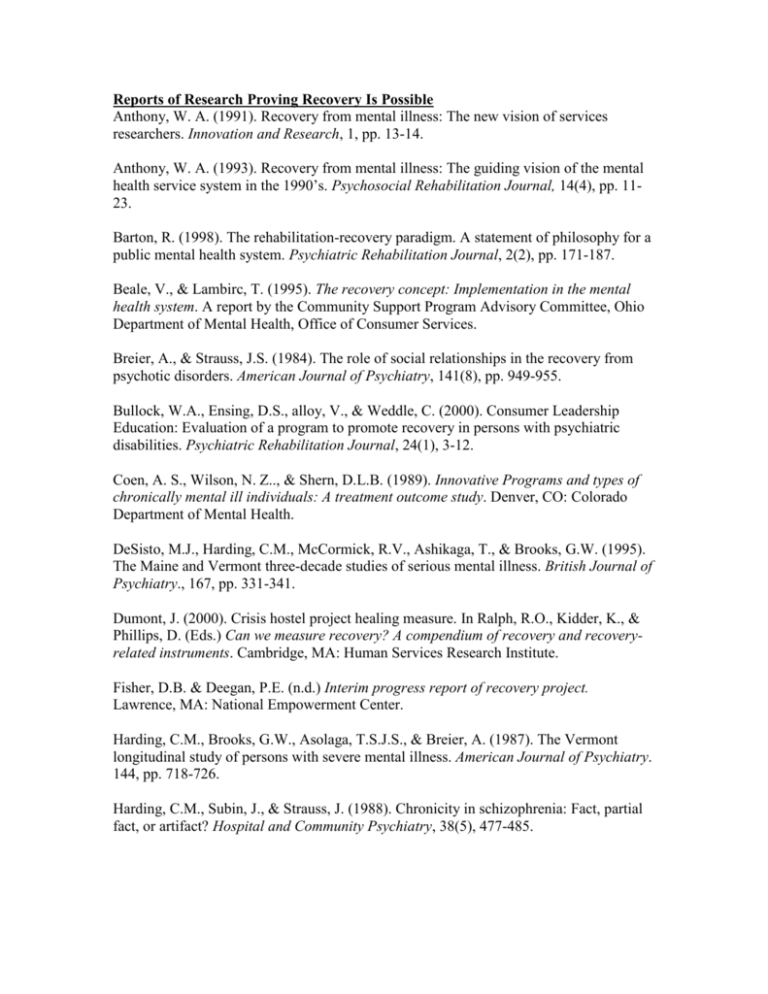
Reports of Research Proving Recovery Is Possible Anthony, W. A. (1991). Recovery from mental illness: The new vision of services researchers. Innovation and Research, 1, pp. 13-14. Anthony, W. A. (1993). Recovery from mental illness: The guiding vision of the mental health service system in the 1990’s. Psychosocial Rehabilitation Journal, 14(4), pp. 1123. Barton, R. (1998). The rehabilitation-recovery paradigm. A statement of philosophy for a public mental health system. Psychiatric Rehabilitation Journal, 2(2), pp. 171-187. Beale, V., & Lambirc, T. (1995). The recovery concept: Implementation in the mental health system. A report by the Community Support Program Advisory Committee, Ohio Department of Mental Health, Office of Consumer Services. Breier, A., & Strauss, J.S. (1984). The role of social relationships in the recovery from psychotic disorders. American Journal of Psychiatry, 141(8), pp. 949-955. Bullock, W.A., Ensing, D.S., alloy, V., & Weddle, C. (2000). Consumer Leadership Education: Evaluation of a program to promote recovery in persons with psychiatric disabilities. Psychiatric Rehabilitation Journal, 24(1), 3-12. Coen, A. S., Wilson, N. Z.., & Shern, D.L.B. (1989). Innovative Programs and types of chronically mental ill individuals: A treatment outcome study. Denver, CO: Colorado Department of Mental Health. DeSisto, M.J., Harding, C.M., McCormick, R.V., Ashikaga, T., & Brooks, G.W. (1995). The Maine and Vermont three-decade studies of serious mental illness. British Journal of Psychiatry., 167, pp. 331-341. Dumont, J. (2000). Crisis hostel project healing measure. In Ralph, R.O., Kidder, K., & Phillips, D. (Eds.) Can we measure recovery? A compendium of recovery and recoveryrelated instruments. Cambridge, MA: Human Services Research Institute. Fisher, D.B. & Deegan, P.E. (n.d.) Interim progress report of recovery project. Lawrence, MA: National Empowerment Center. Harding, C.M., Brooks, G.W., Asolaga, T.S.J.S., & Breier, A. (1987). The Vermont longitudinal study of persons with severe mental illness. American Journal of Psychiatry. 144, pp. 718-726. Harding, C.M., Subin, J., & Strauss, J. (1988). Chronicity in schizophrenia: Fact, partial fact, or artifact? Hospital and Community Psychiatry, 38(5), 477-485. Harding, C.M., & Zahniser, J.H. (1988). Empirical correction of seven myths about schizophrenia with implications for treatment. Acta Psychiatr Scand. 90, (suppl 384) pp. 140-146. Hopper, K., Auslander, M., & Blanch, A. (1996). Taking the measure of the work of recovery: Report from a working conference. Orangeburg, NY: Center for the Study of Public Issues in Mental Health. Hornick, J., Ralph, R., & Salmons, T. (1999). Images of power and solidarity: Assessing relationships between staff and clients of mental health programs. National Conference on Mental Health Statistics. Washington, DC: Center for Mental Health Services. Markowitz, F.E., DeMasi, M.E., Carpinello, S.E., Knight, E.L., & Videka-Sherman, L. (1996). The role of self-help in the recovery process. Alexandria, VA: Proceedings: 6th Annual national conference on State Mental health Agency Services Research and Program Evaluation. Alexandria, VA: National Association of State Mental Health Program Directors (NASMHPD) Research Institute. McGorry, P.D. (1992). The Concept of Recovery and secondary prevention in psychotic Disorders. Australia and New Zealand Journal of Psychiatry. New Zealand Mental Health Commission. (November 2000). Realising Recovery, Through the Education of Mental Health Workers, Recovery Based Competencies and Resources. (http://www.mhc.govt.nz/Publications/Publications/Recovery_Competencies.pdf ) Ralph, R. O., Kidder, K., & Phillips, D. (2000). Can We Measure Recovery? A Compendium of Recovery and Recovery-Related Instruments. www.hsri.org/eval/eval.html. Topor A. et al. (1998). The road back - Recovering from severe mental disorders. Report from a pilot study. Stockholm: FoU-enheten/psykiatri, VsSSO, Report No 4.
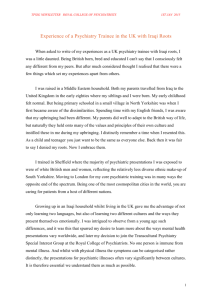

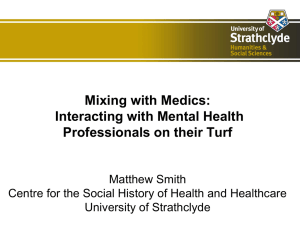


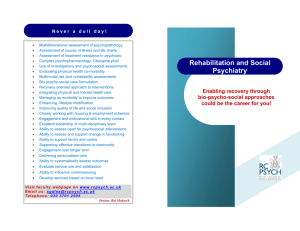
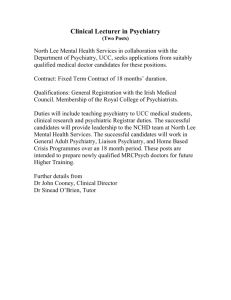
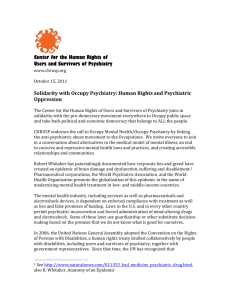
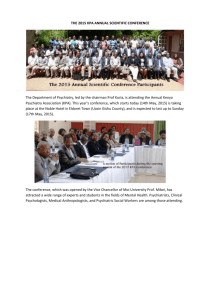
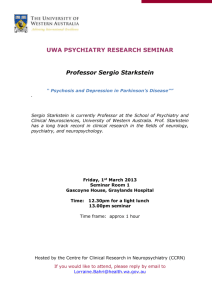
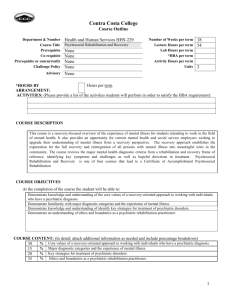
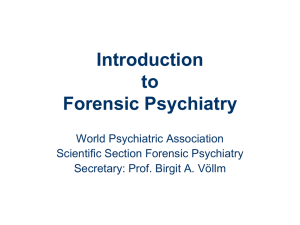
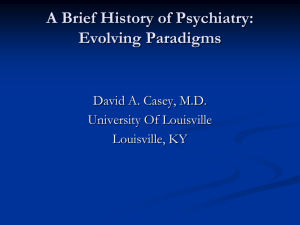
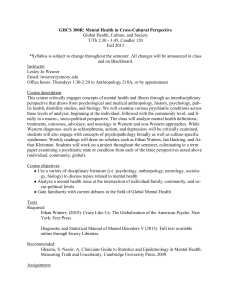
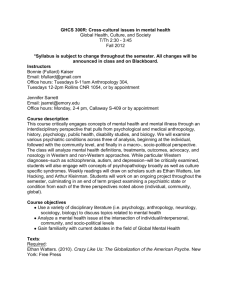
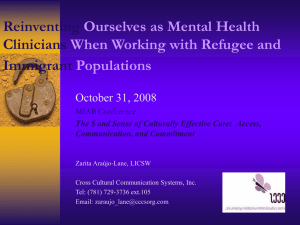
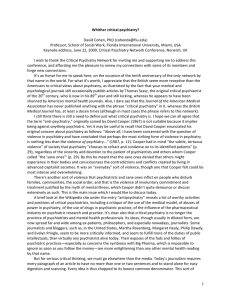
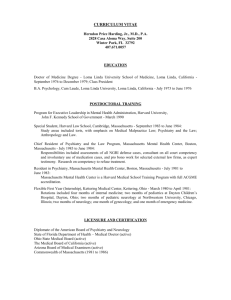
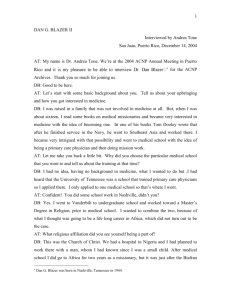
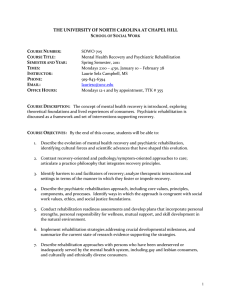
![Illness deception [revised version]](http://s3.studylib.net/store/data/008285672_1-42f007d9a78e6271ab46672f4d7f9064-300x300.png)
